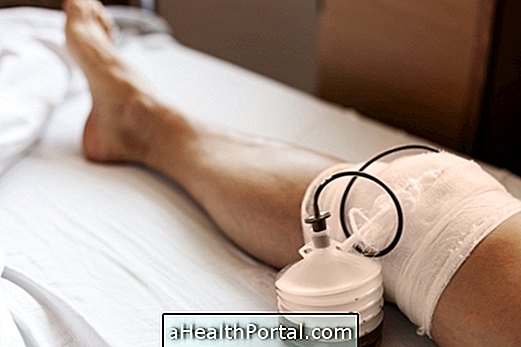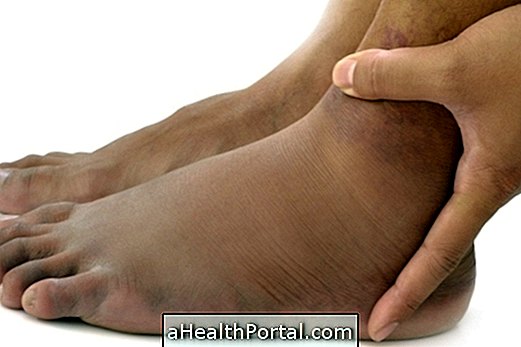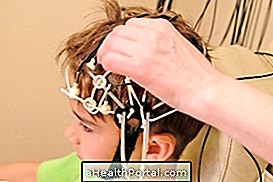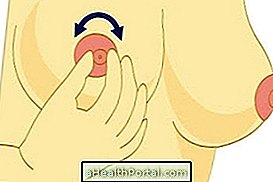To live with the old man with mental confusion, who does not know where he is and refuses to collaborate, being aggressive, one must remain calm and try not to antagonize him so that he is not even more aggressive and agitated.
The elderly with mental confusion, which can be caused by a mental illness like Alzheimer's or due to dehydration, for example, may not understand what is said and resist daily activities such as bathing, feeding or taking the remedies. Learn the main causes in: How to treat the main causes of mental confusion in the elderly.
The difficulties of daily living with the confused elderly may lead to discussions between him and his caretaker, putting his safety at risk.
Here's what you can do to make it easier to care for and live in this situation:
How to talk to the elderly with mental confusion
The confused old man may not find the words to express himself or even misunderstand what he is being told, not following orders, and therefore it is important to be calm while communicating with him,
- Be close and look into the patient's eyes so that they realize they are talking to him;
- Hold the patient's hand to show affection and understanding and decrease aggressiveness;
- Speak calmly and say a lot of short phrases like, "Let's eat";
- Make gestures to explain what you are saying, exemplifying if necessary;
- Use synonyms to say the same thing to the patient to understand;
- Listen to what the patient wants to say, even if it is something I have said several times, since it is normal for him to repeat his ideas.
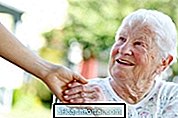


In addition, the elderly may hear and see poorly, so it may be necessary to speak louder and face the patient so that the patient hears correctly.
How to keep the elderly safe with mental confusion
Generally, the elderly person who is confused may not be able to identify the hazards and may endanger their life and other individuals. Thus, it is important to:
- Put a name bracelet with the name, address and telephone number of a relative on the patient's arm;
- Inform the neighbors of the patient's condition, if necessary, help him;
- Keep doors and windows closed to prevent elderly people from leaving home and getting lost;
- Hide keys, especially from home and car because the elderly may feel like driving or leaving home;
- Do not have dangerous objects visible, such as cups or knives, for example.



In addition, it may be necessary for the nutritionist to indicate a diet that is easier to swallow to avoid choking and malnutrition of the elderly. To know how to prepare food read in: What to eat when I can not chew.
How to care for elderly hygiene with mental confusion
When the elderly are confused, it is common to need help to do their hygiene, such as bathing, dressing, or combing, for example, as well as forgetting to take care of themselves, recognize the function of objects and how each task is done.
Thus, in order to keep the patient clean and comfortable, it is important to help him or her perform, showing how it is done so that the patient can repeat and involve him in the tasks so that this moment does not cause confusion and generates aggression.
In some cases, such as in advanced Alzheimer's disease, the elderly are no longer able to co-operate, and in such cases they must be the relative of the elderly. Here's how it can be done in: How to care for a bedridden person.
What to do when the elderly are aggressive
Aggressiveness is a feature of the elderly who are confused, manifesting themselves through verbal threats, physical violence and destruction of objects, and can hurt or hurt others.
Generally, aggressiveness arises because the patient does not understand the orders and does not recognize people and when being annoyed, becomes agitated and aggressive. At these times, the caregiver should remain calm, looking for:
- Do not discuss or criticize the elderly, devaluing the situation and talking calmly;
- Do not touch the person, even if it is to make a fondness, because it can hurt;
- Do not show fear or anxiety when the elderly are aggressive;
- Avoid giving orders, even if simple during this time;
- Remove objects that may be thrown from the patient's proximity;
- Change the subject and encourage the patient to do something they like, such as reading the newspaper, for example, in order to forget what triggered the aggressiveness.
Generally, the moments of aggression are fast and transient, and usually the patient does not remember the event, and at the end of a few seconds he or she may behave normally.
See other care you should take with the elderly at:
- How to prevent falls in the elderly
Stretching Exercises for Seniors

